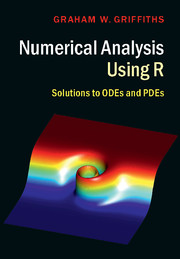Solving ODEs with MATLAB
This concise text, first published in 2003, is for a one-semester course for upper-level undergraduates and beginning graduate students in engineering, science, and mathematics, and can also serve as a quick reference for professionals. The major topics in ordinary differential equations, initial value problems, boundary value problems, and delay differential equations, are usually taught in three separate semester-long courses. This single book provides a sound treatment of all three in fewer than 300 pages. Each chapter begins with a discussion of the 'facts of life' for the problem, mainly by means of examples. Numerical methods for the problem are then developed, but only those methods most widely used. The treatment of each method is brief and technical issues are minimized, but all the issues important in practice and for understanding the codes are discussed. The last part of each chapter is a tutorial that shows how to solve problems by means of small, but realistic, examples.
- Contains a tutorial on the practical solution of ODEs with many realistic examples plus development of the theory of the most important methods as they are used in practice
- Complete MATLAB programs can be used as templates for solving problems
- Discusses delay differential equations, which are especially important for biological models
Reviews & endorsements
' … this is a readable, accessible text full of invaluable advice, illustrated using interesting examples and exercises … if you do have some background knowledge of numerical analysis, MATLAB, and are motivated by the application of numerical methods to real problems, you will find this book full of interest … the book acts as a useful introduction to several important, more general, issues in scientific computing.' The Mathematical Gazette
Product details
September 2003Paperback
9780521530941
272 pages
235 × 191 × 15 mm
0.47kg
35 b/w illus.
Available
Table of Contents
- 1. Getting started
- 2. Initial value problems
- 3. Boundary value problems
- 4. Delay differential equations.









